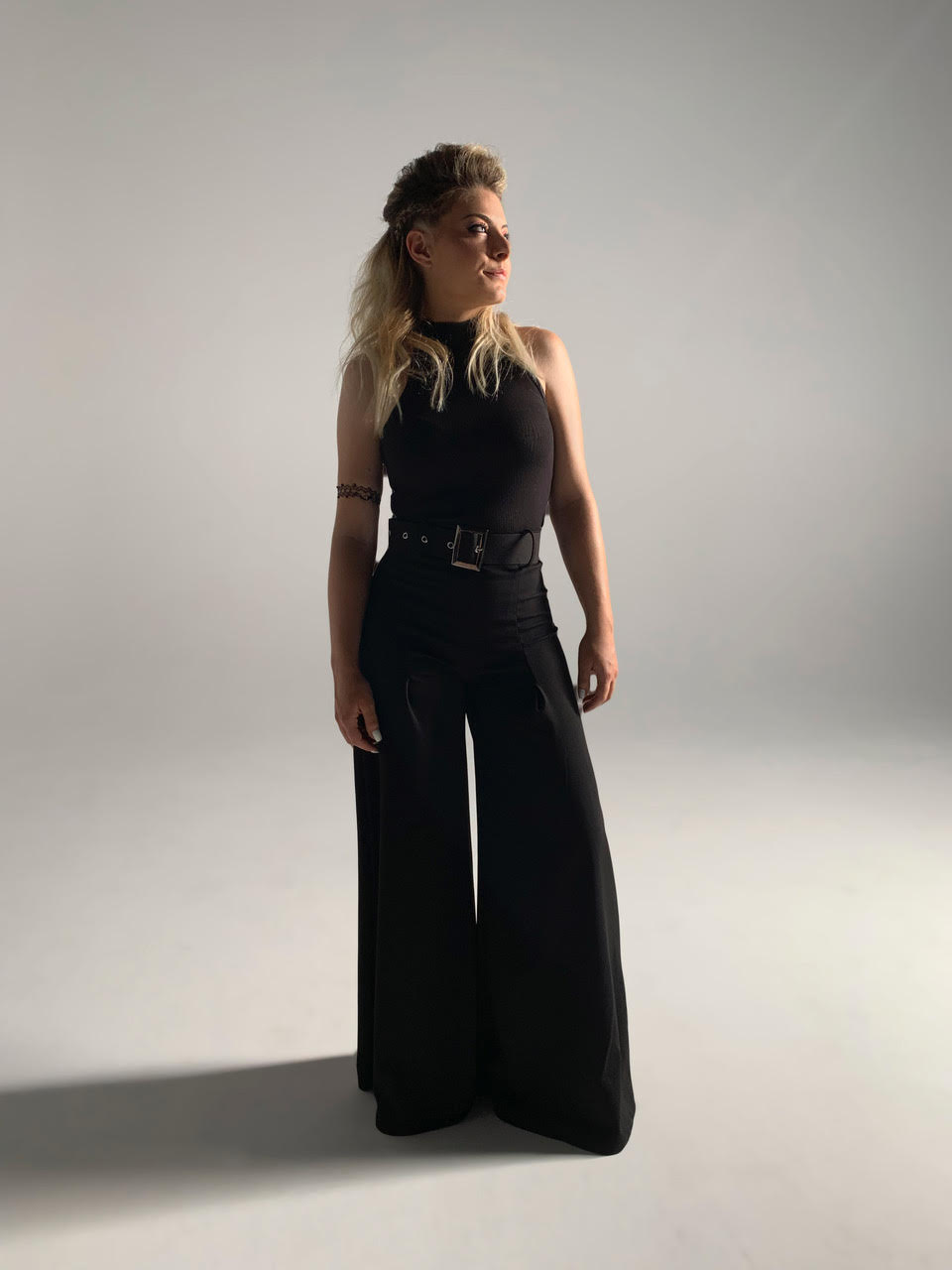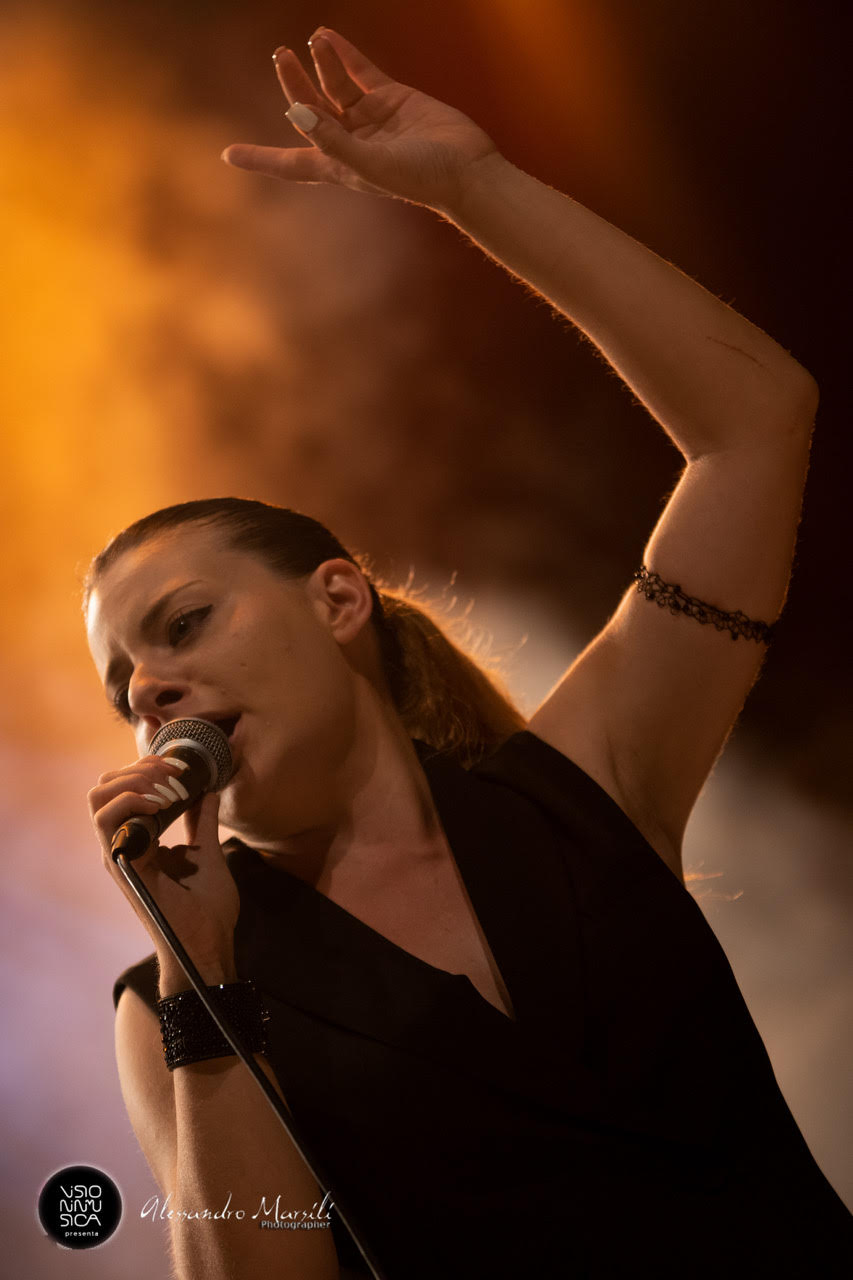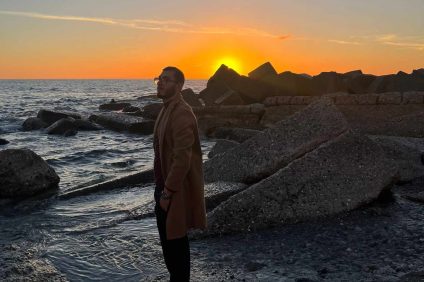How much have your Italian origins and the culture of your country affected your professional career?
For me, the Roman musical culture has been important since I was a little girl because it brought me closer to music as my grandfather sang the "roman stornelli", which today Italians take a little lightly but which, in reality, had a role of all respect in the national artistic panorama. If we think of Lando Fiorini, just to cite one example, artists of this genre told a story, what was happening, the emotions they felt. Feelings that are very different from what we experience now. Today's kids may not understand what it means to wait for a husband to return from the war.
So between dad "romanaccio" and grandfather who sang the folk songs I have always been surrounded by music. All this baggage that I have acquired has perhaps not helped me much on a technical level but certainly in interpretation, especially in hearing a story and knowing how to tell it.
In your opinion, is Italy still a meritocratic country as far as music is concerned? What could be the side effects of not having quality people in show business?
No, honestly Italy is not a meritocratic country. I'm not saying that Italian music isn't full of talent, far from it. In the past it has given the opportunity to make yourself known to great personalities such as Luigi Tenco, Mia Martini; today, however, the concept that anyone can sing, can interpret and, indeed, if someone sings well is considered "old" and this thing is wrong.
A split has been created between what is tradition, which is relegated to something "ancient" and innovation. Taking up the words of great intellectuals of the past, I find myself in the idea that "progress causes an involution".
Not all those who have been innovators and who "arrived" can in my opinion be defined as singers. In the masses today there are those who are still singers, in the true sense of the word. For example Marco Mengoni, for me represents sobriety, tranquility, regardless of his personal choices, from his life. Mengoni is a person who doesn't show off, he was born as a singer and is judged as such, he interprets the songs and sings with his beautiful voice.
It must also be said that most of today's artists "speak", it is not clear what they are saying but all of this is considered innovative.

Of course we need to open up to new worlds, but the greats of the past didn't explore by doing things that turned out to be bad. Schopenhauer researched but didn't talk bullshit. If we think of the Greek tragedy, however, that was innovation but, behind it, there was art.
I'll give an even more current example regarding auto-tune. If you want to put an effect on your voice, that's fine, but if you only sing with this medium and you're out of tune, what message do you send to the kids? What everyone can sing about but isn't like that.
The side effects of not having quality people in show business will be that, in fifty years, our children won't know what the musical tradition is, they won't know who they were, for example, Aretha Franklin, Nina Simone which already happens Now. If a person has studied at least the history of music, known all musical genres, all ways of expression, then he can create his "genre" much more fully.
Do you dream of taking your music abroad? Why?
I dream of taking my music abroad because I've learned to love all cultures precisely because they are different from me; they intrigue me and therefore I would like others to do the same with mine. In addition, bel canto, Italy are unique, we must say.
I was lucky enough to stay abroad for a while, to take part in major competitions and I must say that foreign singers are all technically highly skilled, objectively much more than us. As far as I could see, there are no artists who go on stage and are out of tune. But what they lack, being very set, is our way of "feeling" the piece with the heart. I would really like to export this aspect abroad.
In addition outside of Italy, I have to be objective, the "bel canto" is not considered "old" and the singer of this genre has a cultural space in which he can slip, while in Italy when we talk about opera, unless we are referring to a niche of people who go to the theatre, it is very difficult for a lyricist to have an evening in the square, he is not really brought to these contexts.
Furthermore, if we give the public the opportunity to listen to different genres, they can choose what to appreciate, but if, on the other hand, the same things are always played on the radio, people will get used to that type of music and it will happen that radio listeners will also like it. what I didn't like at first. I'm not saying that we only have to do opera or soul, which is my genre, but we have to recognize that, if a person sings well, is in tune, has a beautiful voice, has something to say, brings emotions and doesn't deserves a little more credit.
She has also performed abroad. Is Italian music still credible outside our country?
Italian music outside of our country is much loved and beyond. Foreigners appreciate a lot even when we interpret songs of their tradition. For example, at “The voice Romania” I performed “Buna Seara, iubite” and the audience went completely crazy. I was scared because I was going to touch a song very dear to Romanians and instead they appreciated the fact that I learned their pronunciation, understood their tradition. That piece was arranged by Roberto Lanzo and was completely different from the original. The audience liked the innovation and I still respected the piece.

Yet another example. On December 3, 2022, in the Palatului hall in Bucharest together with Jonathan Cilia Faro I sang "And the sky doesn't end". Although the public did not understand Italian very well and did not know Mia Martini very well, they listened to him until the end and applauded him. Romanians believe, more than we do, that it is possible to sing a story through music.
What were the main difficulties you had to overcome to become an established artist in Italy?
First of all, I'm not a person who likes to be the center of attention, which many singers say but which is often not true. In my case it is, as I feel under judgment. But then, when the music starts and I start singing luckily all this changes.
As a child, when asked what I wanted to be when I grew up, I always said that I never wanted to sing "to be successful". They are two completely different things for me. They certainly go in parallel and getting both would allow me to live on my passion.
If we talk to today's young girls and ask them the same question, they respond with: "I want to be an influencer, I want to be successful". No one replies: “I want to sing”.
With the arrival of television and in particular with my participation in "I leave you a song" things have changed little by little. I went on stage, closed my eyes and then reopened them and there was only us: me and the music. Today the public appreciates the fact that I go to look inside myself for my emotions and then, opening my eyes, I bring them out. On my way to being on stage someone told me: “You move your arms as if they were the branches of a tree and you tell a story where the leaves grow”. So what initially seemed like my limitation today has become my strength.
The other difficulty is that you always hear yourself say: "You are very good, you are very beautiful, you are very everything" but then in reality "We don't need you, you are too traditional". This aspect embittered me a lot but, fortunately, I have a very solid family behind me and therefore I got over it with ease even if, even today, I hear myself say "You are fantastic but why are you still at home?".
I think that in Italy those who really sing struggle to find their space at the record level because it would make a whole series of radio choices unstable that have been made in the last twenty years.
If I had lived in Giorgia's time, in the period in which she sang "Come saprei" things would have been different. At that time that type of voice, similar to mine, was very popular. Somehow I think I would have had a more fertile ground to be able to express myself while at this moment, in reality, insiders don't know where to place me. Now I don't see all of this as a defeat, as a child I felt pain then, over time, you understand that maybe your role is elsewhere, that everyone has their own destiny.
As an artist, what are your dreams still in the drawer?
I still have many dreams in the drawer. The main one that sums them all up is to make music my job at 360 degrees. I think artists, especially in Italy, don't have the possibility of doing this profession exclusively because in reality, at the end of the month, they don't get there. It is not a profession recognized as such. A singer or she is at the level of Emma Marrone and then she is appreciated by everyone but if she sings, for example, at weddings she still has to find another job to live on.
Abroad this does not happen. If they ask me what I do and I answer the musician, this professionalism is recognized. I believe that in Italy we must take up the concept of art and understand that the latter together with creativity should be nurtured.
If you could duet with an artist of the past (Italian or foreign), who would you choose and why?
I would like to duet with Aretha Franklin because she is my idol. I have followed her since I was a child and she was a "monster of skill", a goddess. She didn't sing set, she was the queen, she has always been true and even from an aesthetic point of view she didn't have any problems.
In your opinion, today, are there still Italian authors and/or composers who represent the true "Made in Italy" or are our songs also simply becoming a commercial product for the use and consumption of fashions?
In my opinion there are still authors who represent the real "Made in Italy" and who are adapting to the times because in Rome they say "you have to camp".
As far as the fact that music is becoming a commercial product is concerned, I must say that texts were written by 4 or 5 hands in Sanremo. I write about it too, but I realize that when I do it for four hands it's not always easy as each of us has our own story, our own ideas and wants to express them. A compromise must therefore be found with the other and sometimes, in doing so, one risks losing one's identity, one's specificity. So I believe much more in what history tells me than in composing together. Battisti, Mogol have always stood out because they were unique.
Maestro Jonathan Cilia Faro who nominated her has always supported the importance of meritocracy and philanthropy in the music field. Who is the singer you admire the most at the moment and in what do you think he contributes to bringing prestige to Italy?
I'll go against the tide but I'm thinking of Renato Zero because despite his age he has a unique timbre. I grew up with him since I have a "sorcina" mother and then because his songs are poems, he tells stories. When he sings, I see images through his words. So regardless of his certain vocal talent, for me he represents the emblem of knowing how to transmit the song and being empathetic.

In the song "Presente", every time I hear it I cry, he says: "how much I miss my hot soup, being first at all costs really tired, I want to breathe poetry, mine". In today's texts the term "soup" is never used, if we think about it, but this word is a daily reality. My grandmother immediately came to mind. Renato Zero's songs have images that today's artists "dream of". He is a singer and a poet.
Speaking of meritocracy and philanthropy, in your opinion among the promising young artists, which artist do you believe deserves to be able to emerge? For what reason?
I think Davide Shorty is very good. He made Sanremo and I don't know him personally but he sings and I like his way of seeking innovation and expressing himself. Besides him, I know and love Eky very much. He participated, like me but three years later, in "All Together Now" and won it. He is a boy of Indonesian origin and he sings Michael Jackson in an extraordinary way, he has perfect timing and he is a sweet person, not full of himself. He is talented. He has achieved important results in his life and could boast and instead is modest.
Following your experience, in your opinion, is it easier to collaborate with other Italian artists or is it more stimulating to do it with foreign singers?
I think it always depends on the character of the person. Surely if you come from the same culture it is easier to collaborate on a linguistic, cultural and emotional level having a certain type of baggage in common. Collaborating with foreign singers becomes a more "sparkling" experience, because you have to understand each other, you communicate in a language other than your own, usually different for both interlocutors and therefore everything is sometimes more difficult but the moment magic is born singing together , then there, you realize that music has no boundaries.
In your opinion, what are the main characteristics that an artist must have in order to establish himself in Italy? Is talent enough?
I am of the opinion that to succeed you must have talent, even if I know that today is not the case. If I could decide, I would like those with talent, heart and humility to be recognized as artists. In my opinion these elements are what made the artists of the past “great”. We are too focused on trying to be and we lose being.
What are your plans for the near future?
I'm going on tour shortly with the Master Jonathan Cilia Faro and I'm very happy about this because he immediately believed in me. I was perplexed, I said to myself: "Why does an Italian who sings well want me?" And he introduced himself and said to me: “Veronica you have talent and I have such a small ego”. Jonathan is a person who, if he sees a twinkle in the other, something special does not exclude him. We will be both in Romania and in Italy, in my hometown. Jonathan really wanted to bring this kind of show to Rome and I care a lot too. It will be an opportunity for my many friends to understand that in addition to the type of music they usually listen to on the radio, there is much more. Roberto Lanzo will also be on stage. It will be a special evening.





